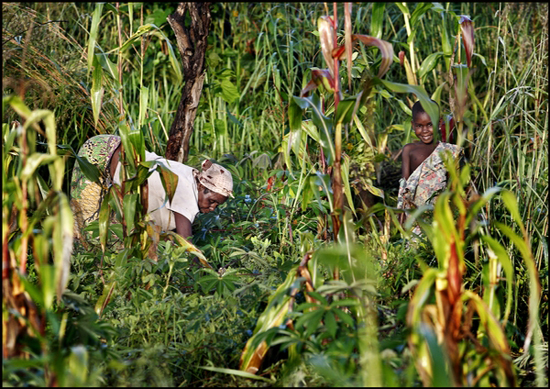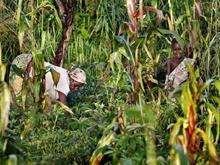After fighting forced a suspension of operations, MSF has returned to continue providing medical care in Shamwana, Katanga Province.

DRC 2008 © Pim Ras
Mother and child work in the field in Shamwana, where MSF recently returned after fighting forced suspension of operations.
On March 3, 2012, Doctors Without Borders/Médecins Sans Frontières (MSF) returned to continue providing medical care in Shamwana, Katanga Province, in the eastern Democratic Republic of Congo (DRC), after fighting forced the organization to suspend its operations and displaced the town’s entire population two days earlier.
“There hasn’t been fighting in Shamwana in nearly six years,” says Katrien Coppens, MSF operational manager for DRC. “When we heard that there were battles between the Mai Mai militia and the government forces [that] drove the population to flee, we were surprised that this was happening in Shamwana, a village that has been secure. In fear, our sick patients got up and left quickly, which made us doubly concerned for their fate."
The team returned to find that the village is still empty of people. Though its medical activities have resumed, MSF remains concerned about the deterioration of security in the area, which continues to hamper the continuous provision of medical assistance to the population.
MSF has been working in Shamwana since May 2006, providing health care to people living in the Kiambi, Mitwaba, and Kilwa health zones. MSF teams provide free primary and secondary health care, treating malaria, tuberculosis, HIV/AIDS, and malnutrition; and providing reproductive health services, mental health care, and emergency surgery. For five consecutive years MSF has also run two fistula camps in Shamwana, where skilled MSF surgeons have repaired obstetric fistulas for hundreds of women.
In 2011, in Katanga province, MSF provided more than 67,000 medical consultations, assisted in 1,223 deliveries, treated close to 25,000 patients with malaria, vaccinated nearly 600,000 children for measles and treated 13,746 measles cases in children less than five years of age.
MSF has been present in DRC since 1981 and delivers primary and specialized hospital care in health facilities and through mobile medical clinics throughout the country.




